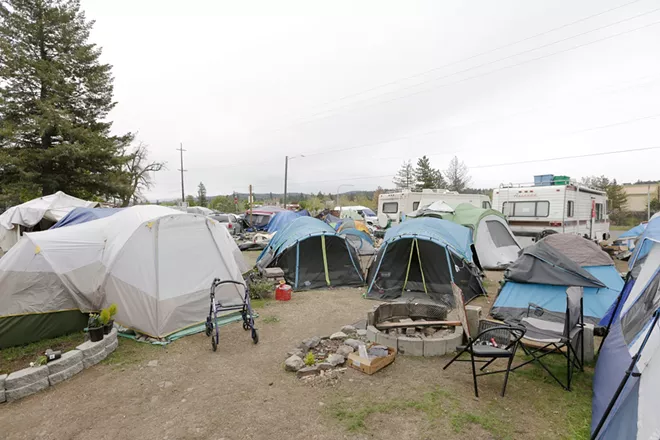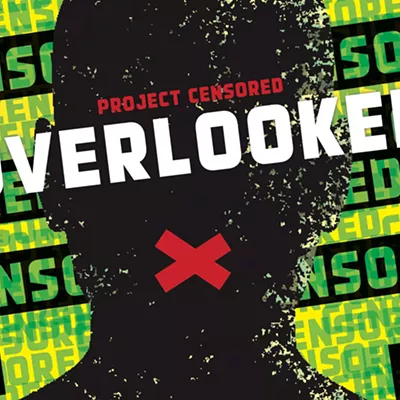
The irony is that Julie Garcia of Jewels Helping Hands says she didn't actually expect — or even intend — for the city to pick the plan she'd submitted on March 31. After all, she hadn't followed the assignment. And that was intentional.
The city had called for contenders to run and operate a homeless shelter and warming center that would be able to accommodate at least 250 guests at a time. But the proposal from Garcia called for an entirely different strategy — 250 tiny shed-like palette homes, set up where the massive "Camp Hope" homeless encampment is in East Central Spokane, where hundreds of homeless people have been living for months. And to support them, they'd partner with seven other local nonprofits, bringing in former City Council President Ben Stuckart to oversee it and help run it.
Garcia says she wanted to show that the city's plan wasn't the only way forward.
"If we just complain to the city, and have no solutions, we're no different than everyone else," Garcia argues.
But there was one detail in the proposal in particular that incensed City Councilman Jonathan Bingle: Stuckart would be making over $150,000.
"I made $150,000 last year," Stuckart writes in a text message to the Inlander. "Gotta charge what I am worth. (And I do know what I'm doing.)"
Bingle says that in his eyes, Stuckart seemed like a "poverty pimp."
"There's a fine line between helping people," Bingle says, "and getting rich off these people."
And that may have just been a philosophical dispute, except Stuckart was also leading the Continuum of Care Board — the very group that the city had tasked to review the proposals and issue a recommendation.
On April 19, Mayor Nadine Woodward's administration decided to throw out the nearly completed selection process, arguing that, along with Stuckart's alleged conflict of interest, still-confidential information had been inappropriately released.
"It was a potentially tainted process," says Eric Finch with the city's Neighborhoods, Housing, and Human Services. "We really just didn't have a choice."
Stuckart decries the decision as the result of a plot "to set me up, to get me in trouble." Bingle, meanwhile, has filed two ethics complaints against Stuckart, one with the Continuum of Care Board and one with the federal Department of Housing and Urban Development.
If you got hit with deja vu reading that, it just means you're paying attention. For years, the homelessness news cycle has been stuck on repeat: A yearly winter scramble for shelter space. A proposal for a new site triggering a flurry of neighborhood objections. Finger-pointing between the city administration and the council. And now, politics and accusations amid a swirl of conflicts of interest and ethics investigations. Rinse, repeat.
TOPSY-TURVY
In some fascinating ways, the landscape has changed around homelessness. Back in 2019, conservatives like mayoral candidate Woodward fought against the rush to create a new low-barrier homeless shelter, decrying such models as simply "warehousing the homeless."
Today, it's conservatives like Woodward and the downtown business community who have been pushing to create a big, new low-barrier homeless shelter, while progressives like Garcia decry such models as simply "warehousing" the homeless.
Heck, Larry Stone, the developer who created the Seattle is Dying-style video Curing Spokane calling for a tougher approach to vagrancy in 2020, bought the East Trent building that the city plans to lease for its new shelter.
Drill deeper, however, and it's not quite the philosophical Freaky Friday swap it appears to be. Even in 2019, some progressives, like Stuckart, were opposed to putting hundreds of homeless people into a single space. They'd seen the backlash from businesses after over 300 people were packed into House of the Charity in 2017.
Woodward quickly found that federal legal precedent handcuffed the city's ability to conduct "sweeps" — enforcing the city's rules against homeless camping and sidewalk sleeping — unless there was enough available shelter. To clear the streets legally, homeless people needed somewhere they could go.
Meanwhile, Jewels Helping Hands, who fought tooth and nail to become operator of the Cannon Street shelter in 2019, quickly learned how tough it was to run a facility after numbers in a single shelter grew to 150.
"It's just all day long putting out fires," Garcia says. "All we did was warehouse them. We didn't actually help them get out of homelessness."
She notes how this winter's experiment with turning the Spokane Convention Center into a warming center quickly ended in a disaster: Packing 300 people in a single space resulted in an explosion of vandalism — an estimated $110,000 in damage.
But it also illustrated the desperate need for more available shelter. Over the past year, Finch says, the Woodward administration has scrutinized over 100 potential shelter locations.
City Council member Zack Zappone is wary of the motivation.
"Their goal was to say that they have enough shelter beds and they can now start enforcing more sweeps," Zappone says, "rather than getting people to stable housing."
Either way, getting new shelter beds has been a struggle. In mid-April, the Continuum of Care Board, a local nonprofit tasked with managing federal housing and homelessness grant funding, voted down a recommendation to make the Guardians Foundation the operator of the proposed East Trent shelter. Stuckart didn't vote and let everyone know he was recusing himself because of a conflict of interest. But Bingle says Stuckart didn't go far enough.
Bingle hands the Inlander a manila folder containing the Continuum of Care's ethics policy, which also says board members must avoid "discussing" or "lobbying" on a matter when they have a financial stake in it. And the folder also contained meeting minutes filled with examples of Stuckart discussing and lobbying.
Stuckart says he read the policy but didn't see that line.
"Nobody, not a single person on the board, nor a single employee, was aware of that line in the conflict of interest statement," Stuckart says.
The conflict-of-interest section is four pages long. Everyone on the Continuum of Care Board was required to review it this year, and sign that they read it.
"There's a very old expression," Bingle says. "Ignorance of the law is not a defense of the law."
If there's anyone who should have been reading closely, it was Stuckart. Exactly one year earlier, Woodward had announced the results of a state auditor investigation, scrutinizing whether Stuckart had failed to adequately disclose a potential conflict of interest for a 2019 shelter selection process involving the exact same applicants, including Jewels.
An Inlander records request showed that Stuckart had been generous to all applicants, but particularly to Jewels. He gave them a nearly 50 percent higher score than other members of the review committee.
While he didn't have a direct connection to Jewels, one of Stuckart's previous campaign donors — and mentors — Sharon Smith, who co-runs the Smith-Barbieri Progressive Fund, was Jewels' fiscal sponsor.
"We came in and said, 'Alright, we're going to take the risk if Jewels implodes,'" Smith told the Inlander last year.
Jewels had submitted its "risk assessment" paperwork to the city as the Smith-Barbieri Fund. Yet, Smith says, neither Stuckart nor Smith-Barbieri would financially benefit if Jewels was selected. (And that time, they weren't.)
Still, the state auditor urged the city to more closely scrutinize conflict-of-interest procedures. But flash forward a year and, it seems, nobody did. Weeks after Stuckart announced his conflict of interest and nobody — not Stuckart, not Jewels, not the other Continuum of Care Board members, not the city — had looked up the rules apparently.
Today, Stuckart argues that because the Continuum of Care Board's vote was only advisory, the conflict of interest policy didn't technically apply. Furthermore, he speculates that the search process never would have been abandoned had the vote come out differently.
"This is all about city payback," Stuckart says.
ETHICS AND TRUST
Stuckart also claims Bingle's ethics complaints were part of a politically motivated ploy.
"Bingle's not smart enough to come up with the complaints on his own," Stuckart argues. "This was directly from the mayor's office."
Bingle, who says he's "flattered" by being "underestimated," says the idea to file the complaints came from conversations with the city attorney's office, but repeatedly claims that only he and his assistant were involved with writing the complaints and the press releases. Nobody else.
Yet when the Inlander asked Bingle about a line in his complaint referencing an "attached email correspondence" between Stuckart and Garcia, he seemed unfamiliar with what attachment that referred to. And when the Inlander asked Bingle if his 2021 campaign consultant, former Cathy McMorris Rodgers campaign manager Emily Strode, was involved with his complaints, Bingle repeatedly refused to answer.
Bingle wasn't the only one filing an ethics complaint. The Woodward administration also claimed that City Council President Breean Beggs had tainted the process by sharing the shelter operation proposals with fellow council members. So Tom Bassler of GVD Commercial Properties filed a complaint against Beggs through the city's ethics complaint process.
In particular, Bassler blames Beggs for the process needing to restart.
"When you don't follow rules, you have things fall apart," Bassler says. "Everything is short-staffed, and now we have to repeat doing things."
Beggs' rebuttal is simple: He only shared the proposals after the initial vote had been taken. There was never a good reason, he argues, for restarting the process.
Either way, Finch, with Neighborhoods, Housing, and Human Services, says restarting the operator search was worth it. If they hadn't, he believes that it could have resulted in lawsuits, and it would undermine trust, he argues.
"Trust is one of the hardest things to kind of keep and maintain and to grow," Finch says.
Slowly, he hopes, that's improving. At the very least, shelter operators, city officials, activists and council members see a broad agreement that more shelter space is necessary.
A new round of proposals from shelter operators and service providers were submitted two weeks ago, Finch says. Stuckart's board will not be involved in the selection. Because there have been so many other kinks to work out, including hammering out details of the lease, Finch expects the extra delay created by the restart to be minimal.
Last week, the City Council finally officially approved a zoning ordinance change allowing industrially zoned land to be used for homeless shelters, including the potential East Trent shelter.
But the council has remained frustrated with the lack of clear information from the administration. In the mayor's State of the City speech, Woodward announced that Catholic Charities planned to move the House of Charity downtown — and expand the number of beds available — but the details about the city's involvement remain hazy.
"I'm hopeful that we will eventually have a new shelter," Zappone says. "Hopefully a lot of new shelters."
After all, just one shelter won't be enough. Today, "Camp Hope" has grown to more than 400 residents. Even if every one of them moved into the East Trent shelter, there still would be over 150 unsheltered residents remaining.
Finch says the city hopes to break out of this cycle, to secure enough shelter space so that the city doesn't have to scramble every year. Stuckart says he's hopeful that shelter capacity will continue to improve. The problem is, the number of homeless people just keeps growing.
"Until you fix the housing situation, this is all just Band-Aids," Stuckart says. "Nobody's really looking to fix the big problems here." ♦


























